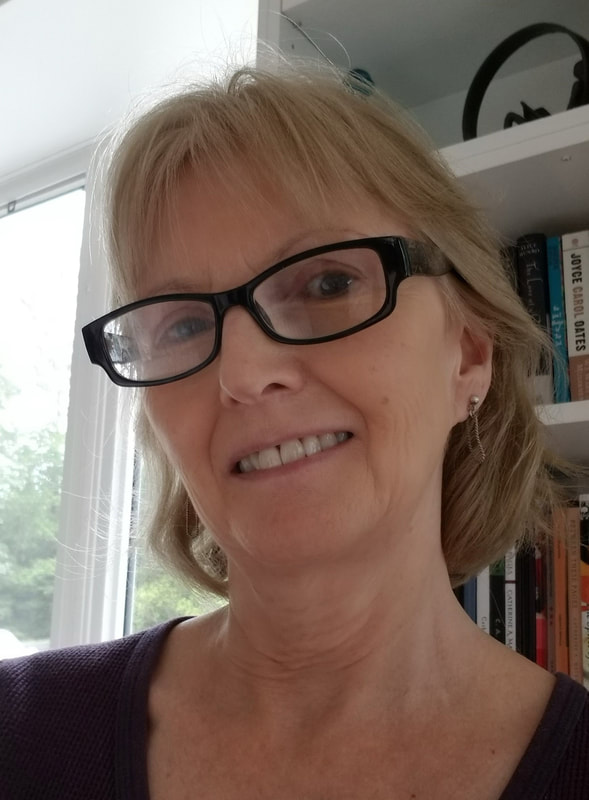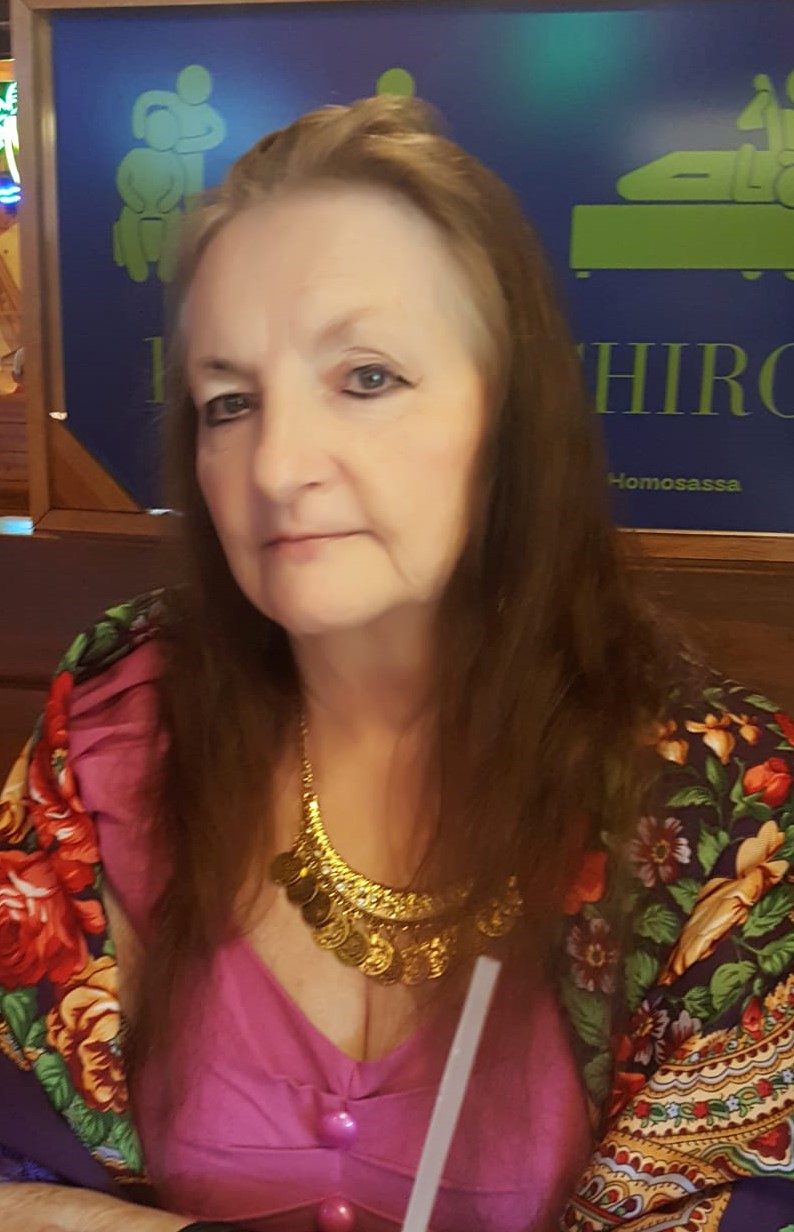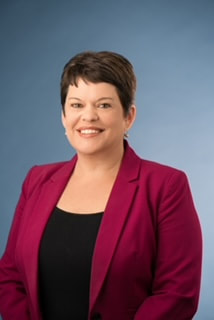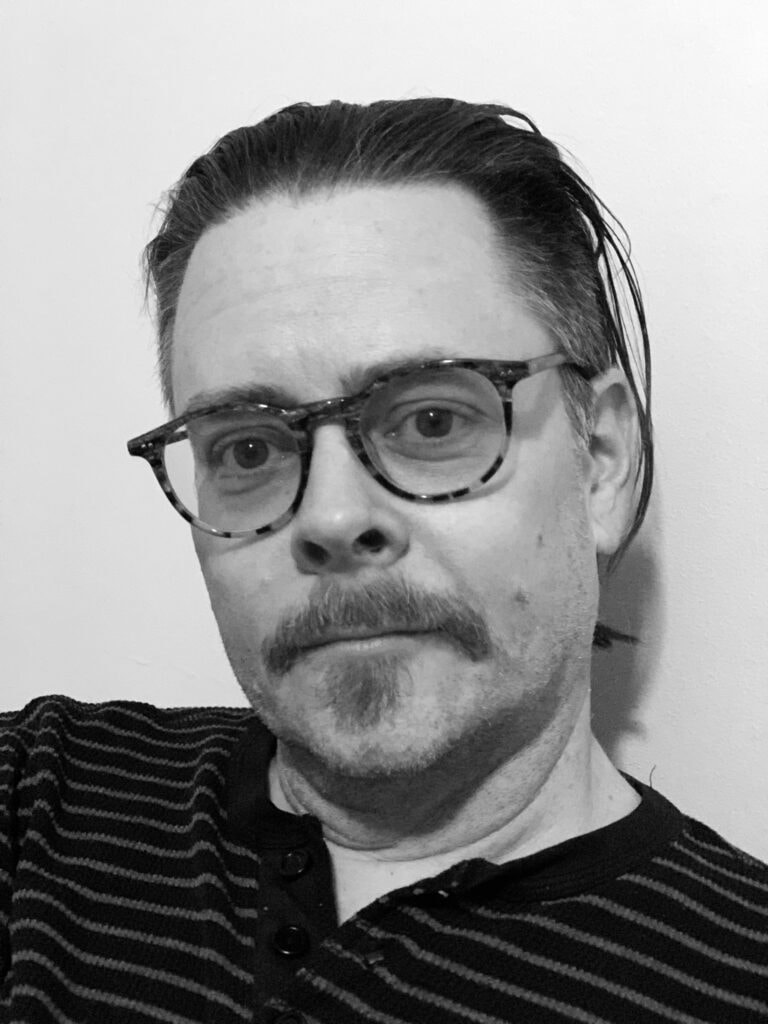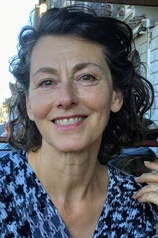|
SUMMER'S END by E. E. King 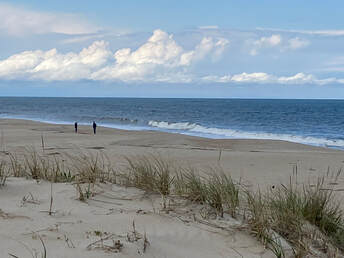 Click here to listen to this story on the Kaidankai podcast. Kate and Michael had come to the beach for the entire summer. Three months stretched out before them endless as the tide that painted white ribbons of foam on the sand. A diving pelican crashed into the waves as if someone had dropped a small rock out of the sky. They stood hand-in-hand breathing shallowly, motionless, made temporarily mute and still by the glory before them, but only for a moment. Then they kicked off their shoes and socks, leaving them behind like the discarded skins of cicadas clinging to the tall, golden grass that lined the beach. Never looking back, they raced toward the crashing sea, laughing hearts beating in time with the tide and with all of creation on this perfect first day of summer. It was a summer that would last forever. They knew it by the way the sand crept in between their toes like the rough, adoring tongue of a family dog. Somewhere, in a distant world, the townies stocked empty shelves with shiny packaged goods, filled their freezers with bags of ice and waited. Their parents prepared the Summer House, unpacking their suitcases, putting food in cupboards, ordering propane, and doing all the boring, unimportant things grownups did. It was a strange beach, full of odd mounding stones that formed a wavy line right where the high tide washed against the shore, darkening each grain of sand. The mounds had once been sand themselves, hardened into rock by the centuries. That very first day when they ran breathlessly down to the sea, daring the waves to catch them, Kate thought she saw first one, then two, then three, then dozens and dozens of boys, each standing in front of a stone mound, flickering in the mist that had risen from the meeting between sea and shore. But it had only been a trick of light, an illusion of the rising shimmering heat, of salt and surf and too much sun. Because when she blinked and rubbed her eyes, the mist and boys were gone, vanished into foaming surf. “Did you see…” began Kate turning to Michael, but he was playing tag with the tide, screeching with laughter as the chill waters nipped his toes. * “This coast has history,” Father had said. “It was home to an ancient people and you can still find artifacts on the shore and in the woods.” “Arrowheads? asked Kate. She loved searching for treasures, carved stones, odd rocks delicate seashells, and almost any kind of feather. Whatever she could find, which in the city wasn’t much. Michael preferred books, magical lands that would not dirty his feet, scratch his thighs or make him itch, but only mark his imagination. He lived in a world apart from other boys, a place of gods and monsters, of dragons and enchantments. It made school difficult. “There might be arrowheads, Father said, “Or small round stones that they used to place on the graves of their dead to make sure they didn’t rise from the earth. They feared ghosts and worshipped a wild god of sea and woods, a kind of Pan.” “Pan?” asked Kate. “A frying pan?” “No silly,” said Michael. “Pan was a god with goat legs and horns who played a bamboo flute. No one could resist his music.” “It is said they stole children from other tribes, and buried them alive, under bridges and beneath crossroads as a sacrifice to their god. In exchange, he left them alone and kept their children safe.” “Are kids buried under our street?” asked Kate. “Perhaps we should go out tonight with a shovel and see… Ah hahahaha….” Father’s voice rose into a maniacal chuckle. “Jonathan,” Mother said. “Don’t scare the children. “I’m not scared,” said Michael, but he shivered despite the heat. * Now they forgot ghosts and history, arrowheads and dead bodies. They played chase with the tide letting the cold waters tug their toes, before running backwards screaming. “Look,” said Michael, poking his big toe into the damp sand, so that the grains dried, making a lightened circle around each foot. “It’s as if each step I take turns the earth into diamonds.” Kate poked her toe in, too. “We’re rich,” she cried. “I’m turning everything into diamonds!” “It’s how they will know that we are the King and Queen,” Michael said. “All the people will follow the shining footsteps and crown us, Rulers of the Beach.” They marked solemnly down the shore, tucking big toes into sand, so caught up watching the creation of diamonds they didn’t notice the boy standing in front of them until they saw ten naked toes wiggling at the edge of their circle of light. The boy was four or five years older than Michael, his ragged cut-offs were frayed and faded. His bare chest had been tanned same deep bronzed color as the wet sandstone dunes. Ocean breezes tousled his sun-whiten hair. And his light brown eyes were tawny, almost golden, flecked with tiny grains of darkness, like bugs in amber. “I’m Tom,” he said, holding out a salt-rough hand. “I’m Kate and this is my brother Michael.” “Come play,” Tom smiled. And in the way of children and young animals, that was the only introduction they needed. They raced down the shore looking for seashells and curious stones. “Look,” Michael pointed. “That moved.” Tom scooped it up. “It’s a hermit crab,” he said. “They don’t even make their own shells, they just look for empty ones and use them. When they get too big they have to find a new home.” * At night, their parents let them go to the beach. “But just for an hour,” Mother said. “And don’t get wet.” At the shore’s edge Tom waited. They wandered the strand, searching for small white sand dollars so fragile, a mean look could shatter them into a million pieces. “Oh,” Kate pointed at one sand dollar as big a flattened tennis ball. Tom scooped it up and broke it. “Why…” began Kate, till, like a conjurer, Tom extracted small bits of dove-shaped bones from the shell’s fragments so perfect, it seemed they might fly away into the setting sun. Tom showed them how the night water flashed when they moved their hands beneath the surface. “It’s magic!” cried Michael, making light trails in the water with his fingers. But Kate knew it was not magic. She was the more skeptical of the two, less trusting, less willing to accept the welcoming invitation of an open door. Tom studied them. “You’re both right,” he said. “Those light flashes are actually caused by little animals… or maybe they’re plants, I forget which. But you can only see them at night, when the water is stirred up.” “Then how is he right?” Kate said. “I’m right. It’s made by animals.” “Or plants,” said Michael. “Or plants,” agree Kate. “And neither animals or plants are magic.” “They can make light,” said Tom. “I mean - you can’t make light - I can’t make light, but they can – isn’t that a kind of magic?” Kate supposed Tom was just being nice, trying not to make Michael feel dumb. She liked him for it. Michael was usually not so lucky. All year long he’d been called a sissy, a girl, a moon-calf and a dreamer for preferring stories to baseballs, and magic kingdoms to soldiers. “But I can make light,” Michael cried. “Look! Everywhere I walk turns to diamonds!” He raced to where the tide had turned the sand dark and poked his toes in, pulling the grains upward. “We are rich!” cried Tom. They raced down the shore together, laughing and jostling each other until Michael lost his balance and tumbled into the damp surf. “Uh oh,” said Michael “Uh oh,” said Kate. “You are going to be in trouble.” She drew it out long, like it was two words- troub- el. Michael shivered “Just wash it off,” said Tom, pulling him toward and under the beating waves. Michael struggled. Then he emerged, soaking and shivering, coughing up water as salty as tears. Michael stumbled up and chased Tom out of the water. Tom, though half wet, didn’t even seem cold, but Michael’s skin was as bumpy as the plucked chicken Kate had once seen hanging from a butcher’s window. “Won’t you get in trouble?” Asked Michael. “Me?” Laughed Tom. “I’d like to see someone try. Besides, I’m not the one who’s all wet.” “You are now,” said Kate, pushing him backward into the lapping waves. He held onto her arm, dragging her with him. Soon all three were rolling in the sand and icy water, sputtering and laughing. * Kate and Michael got in trouble. “Where does this Tom you talk so much about, live?” Asked Father. “Is he a townie, or are his people, summer people like us?” Summer people. Kate liked the sound of that. As if they could spend their whole lives in summer, never returning to school, and winter, and the tormenting laughter of other children. “I don’t know,” said Kate. “Haven’t you asked him?” Her father shook his head and sighed. “What do his parents do?” Both children looked at him as if he were speaking a foreign language. They didn’t care what Tom parents did, they only wanted to play in the waves, hunt for hermit crabs and sand dollars and make glowing trails of light in the night sea. “Why don’t you ask Tom to come for dinner,” said their mother. And Kate did, but Tom just shook his head. “Can’t,” he said, disappearing into the darkening night. The children watched him go, fading into the flickering luminescence of sea and shore. * One night, at the end of summer, as they raced to meet Tom, Mother gave them a big bag of sunflower seeds. “One – two - three - Crunch!” Shouted Tom. They cracked in unison, spitting the empty husks into the surf and chomping the small tender seeds like a chorus of frogs. Kate still remembers it as the happiest night of her life. Why was it so wonderful? So much fun? She still doesn’t know, only that for a moment, they were all together, heart, soul, mouth, and teeth working as one. Michael had been right after all, she thought. It had been magic. Magic, making the sea glow. Magic, letting them move through sand, surf and summer as though they belonged. * The night after the sunflowers seeds, Kate, Michael and Tom played hide and seek. The obvious place to hide was the behind a mound. So Kate lay in the tall golden grasses, barely breathing, but they scratched her bare arms and legs, and the sand fleas nipped her ankles. Cautiously she raised her head. No one was in sight. She sprang up, racing to crouch behind a dune. It must have been the perfect hiding place, because they never found her. She never found them either. She returned home after dark, tired and dirty. “Where’s Michael?” asked Mother. “He’s not home?” asked Kate. “No.” “We were playing hide ‘n seek with Tom and I lost them.” “Tom again,” said Father. “I’d like to meet that young man and his parents.” They waited for three hours, but Michael didn’t return. * The police were called. Mother and Father asked about Tom. But neither the police or the townies had seen, or heard of a ragged boy with golden eyes and beached hair. They grew silent when questioned, hastily changing the subject, organizing search parties, spending days and nights combing beach and woods. “It just shows how good people can be,” Mother wept. “All these neighbors we didn’t even know we had. I always looked down on the townies… b-b-but now…” “Don’t worry,” said Father. “We’ll find him.” He put an arm around Mother and patted Kate’s arm awkwardly. But Kate knew they would never find Michael. The night after he had not come home she had raced down to the shore, searching for Tom. She did not find him. Instead she saw a new mound. It looked like all the others, but slightly darker, slightly fresher as if it had only now changed from sand to stone. And surely, thought Kate, there must be a single moment when that happens? When sand becomes stone, summer turns to fall, ancient gods return. and childhood ends. She knew that Michael had joined the other children, the ghosts she had seen that very first night, flickering in the light between day and dusk, shimmering in the place between shore and sea. * Kate could imagine the scene. “Why don’t we bury each other?” “Me first! Me first!” cried Michael. He lay down on the damp line where the water met the land. “No,” said Tom. “We have to dig a hole first, otherwise your toes will show. Lie here.” He carefully scooped out a hole just a little bit bigger than Michael’s body. Throwing handfuls of wet sand back into the sea. The tide flattened them into beach and swept them away leaving no trace. * But Kate was wrong about two things, or perhaps she was both right and wrong. For she did see Michael one last time. It was not he, who was buried under the mound by the sea, or at least not yet. It was five years after his disappearance. She’d been begging Mother and Father to return to the Summer House. “I want to go in memory of Michael,” she’d cried. Tears flowing down her face like rivers to the sea. “I want to return to the place of our last summer.” Mother shook her head, retreated to her room and bolted her door. The catch clicked in the silence, as final as endings. “I will take you,” said Father, his voice flat and toneless as a tide-less ocean. This trip was as different as from the last one as day from night, as life from death, as joy from sorrow. There was no joking talk of ghosts, or arrowheads. There was no talk at all. Kate had to wait till Father was in the bathroom to race down to the beach. The sun was sinking into the ocean. A splinter of light lingered on the horizon and was gone. A tattered cloud, like a blood-spattered rag, swayed over the spot of its going. Then dusk crept over the sky, darkness crept over the sea, and all was as still as the last sunset at the end of eternity. She remembered watching the sun sink into the waves from this very spot, hand and hand with Michael, not so long ago, but a lifetime away. And then, in front of the newest mound of sand she saw two boys dashing madly through the surf, foam breaking against their legs as bubbly as laughter. “Hey!” Kate called. The boys froze. They turned toward her in the dying light. One was a stranger, but the other was Michael, her Michael! She tried to call to him but the words stuck in her throat. For just a moment his face was illuminated by the fading light and she saw his eyes, no longer the clear blue of a cloudless sky, but tawny, almost golden, flecked with tiny grains of darkness, like bugs in amber. He stared at her like a stranger, like a townie, like an adversary, then pulled the unknown boy off into the sea and the sand and the night. E.E. King is an award-winning painter, performer, writer, and naturalist. She’ll do anything that won’t pay the bills, especially if it involves animals. Ray Bradbury called her stories, “marvelously inventive, wildly funny, and deeply thought-provoking.” She’s been published in over 100 magazines. Her novels include, Dirk Quigby's Guide to the Afterlife: All you need to know to choose the right heaven . She’s shown paintings at LACMA and painted murals all over! She also co-hosts The Long-Lost Friends, spends summers rescuing birds and winters planting coral. Check out paintings, writing, musings, and books at: www.elizabetheveking.com and amazon.com/author/eeking www.elizabetheveking.com https://twitter.com/ElizabethEvKing facebook.com/pages/EE-King https://whatsinanafterlife.wordpress.com/ https://www.instagram.com/elizabetheveking https://www.pinterest.com.mx/elizabethevie https://www.youtube.com/channel/UCHEEgte6Bgv-r1OaHz3Mf1Q amazon.com/author/eeking
0 Comments
Leave a Reply. |
A SPECIAL, SPECIAL THANKS TO THE JUDGES OF THE HAUNTED HORROR CONTEST:
Catherine A. MacKenzie's
writings are found in numerous print and online publications. She writes all genres but invariably veers toward the dark—so much so her late mother once asked, “Can’t you write anything happy?” (She can!) She’s published two novels: Wolves Don’t Knock and Mister Wolfe. Two volumes of grief poetry commemorate her late son Matthew: My Heart Is Broken and Broken Hearts Can’t Always Be Fixed. She has also published other books of poetry and short story compilations, all available on Amazon or from her. Her latest publication is an anthology with 75 authors: No One Should Kiss a Frog. She’s also compiling stories for two anthologies about loss. Check her website for submission details - http://writingwicket.wordpress.com Cathy lives in Halifax, Nova Scotia, Canada. Linda Sparks
is a published poet and author of 25 published books. Her stories have been featured on the Kaidankai podcast and by Sweetycat Press, Ravens Quoth Press, Clarendon House Publications, Spillwords, and other publications. She served as Editor for Valkyrie Magazine. She was selected as “Best In Collection” 2023 by Ravens Quoth Press and she also won the Emerald Award for her poem “Dancing Girl” awarded by Sweetycat Press. She prefers writing horror but also writes science fiction, paranormal mystery and fantasy. She lives with her family in Florida. Tricia Edwards
is Deputy Director for the Smithsonian Institution Traveling Exhibition Service and Smithsonian Affiliations (SITES | SA), where she provides executive leadership and direction for overall planning, development, and management of SITES | SA programs and activities. She is currently leading the organization in the implementation of a new strategic plan to catalyze public engagement and spark learning, enjoyment, and wonder by connecting the resources of the Smithsonian to a vital network of museums and other educational and cultural organizations. Prior to this role, she served as the Deputy Director for Smithsonian Affiliations and Interim Deputy Director for Exhibits, Finance & Administration for SITES. Bram Stoker Award nominated author and editor, Douglas Gwilym has been known to compose a weird-fiction rock opera or two. His short story "Year Six" is on Ellen Datlow's recommended reading list for Best Horror 14. He co-edits The Midnight Zone—forthcoming edition, Novus Monstrum, a collection of never-before-seen monsters, featuring original stories by greats, and new voices, in strange, dark fiction. He reads classics of the proto-Weird on YouTube and has been guest staff at Alpha Young Writers workshop. His short fiction appears in LampLight, Lucent Dreaming, Dark Horses, Shelter of Daylight, Tales from the Moonlit Path, Penumbric, Creepy podcast, and Tales to Terrify.
Linda Gould
hosts the Kaidankai. She is a journalist and author whose fiction and non-fiction work has appeared in outlets around the world. One of her fondest memories is hanging out summers in a tree or in the back corner of the library reading ghost stories. |
